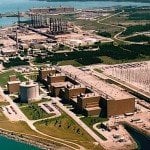Canada’s pipeline companies say they support the federal government’s new pipeline safety and performance guidelines. The guidelines were announced by Joe Oliver, the minister responsible for the National Energy Board (NEB).
“We encourage strong, independent regulatory oversight of our industry, which will provide further assurance to Canadians that our member companies are committed to continually improving pipeline safety,” said Brenda Kenny, CEO of the Canadian Energy Pipeline Association (CEPA).

Among the provisions to be “enshrined in law” is the “polluter pay” principle, intended to ensure that the taxpayer isn’t stuck with the bill for cleaning up a pipeline leak. Companies that operate pipelines will have to demonstrate that they have the financial resources to “respond to any incident and to remedy damages,” Oliver said. The law will require such companies to have a minimum financial capacity of $1 billion. At first the new rule, along with others, will apply to new federally regulated pipelines, but they will be extended to cover existing pipeline companies over a transition period.
In line with updates announced last April, the government says it will hold senior pipeline company leadership accountable for building “a safety culture,” with a senior company officer in charge to ensure that the company has proper management and security programs in place. The security system must be one that “anticipates, prevents, manages and mitigates” conditions that could damage either personnel or the environment. There must also be an emergency preparedness regimen in place.
Penalties announced for contraventions of these regulations range from $25,000 to $100,000 a day. This will come into effect on July 3. Cases of negligence could also be subject to criminal charges.
Another point that has been clarified concerns the government’s role regarding abandoned pipelines. The rules make clear that even after a pipeline has been abandoned, the NEB continues to have jurisdiction over it, and the pipeline’s operators continue to be responsible for any costs and damages that occur as long as the pipeline is on the ground.
“Our industry is particularly glad to see that the government has clarified the jurisdictional issues regarding abandoned pipelines, but one thing is for sure: landowners will not be responsible for abandoned pipelines,” said Kenny.
These regulatory changes come as Canada awaits the Obama decision regarding the Keystone XL pipeline that will take “tar sands” oil from Alberta to Texas. President Obama linked approval of that pipeline to assurances that its construction and operation will not increase greenhouse gas emissions.
Canada’s transmission pipeline companies operate approximately 114,000 kilometres of pipelines in Canada. In 2012, they moved approximately 1.2 billion barrels of liquid petroleum products and 5.1 trillion cubic feet of natural gas, according to CEPA.
































